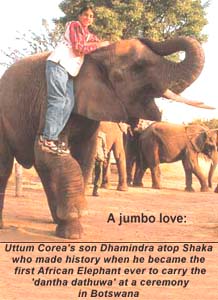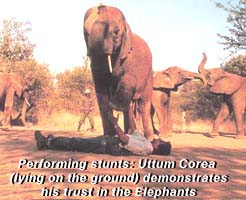 |
 4th October 1998 |
Front Page| |
 An African love story |
Contents
|
|
 |
An African love storyThis is a love story. A relationship based on trust and lots of tender loving care between a Sri Lankan family and four large African pachyderms in Botswana Mihiri Wikramanayake meets Uttum Corea who tamed and trained orphaned elephants It all began one evening, in 1990, when Uttum Corea, his wife Dinky and their three children, eleven-year-old Eresha, seven-year-old Thushara and Dhamindra, eight years, were watching television in their home in Botswana and saw the horror of the culling of African elephants in the Kruegar National Park in South Africa. According to the television report, the Kruegar National Park could only support up to 7000 elephants within its fenced area. Therefore, due to the growing pachyderm population and lack of cultural reverence towards this animal, the ecologists had decided that the best way to get rid of its growing numbers was to cull them or in other words to kill them off. The Boors, or the farmer stock, had no use for these animals, and used the meat and tusks of the elephants for other purposes so the ecologists kept the surplus population down by culling. This was their management process. However, the report went on to say that the young elephant would not be culled but spared if they were to be looked after in some other form. At the end of the television program, the Corea family was emotionally stirred by the plight of these pachyderms. As one already knows, elephants live in a closely- knit social structure very much like a human family unit. The young elephants depend very much on their mother, sisters and brothers, aunts and other relatives. The older members of the herd play a vital role in the upbringing of their young offspring. This learning process is an integral part in the well- being of the herd. Therefore, a young elephant seeing its entire family being shot to death is severely traumatized. It would suffer from shock and fright and show obvious signs of distress, such as shivering and shaking and actually shed tears of sadness. Coming from Sri Lanka, where elephants play a vital part in their traditional and cultural lives, the Coreas felt a special empathy towards these hapless creatures. Uttum Corea, who owns and trains thoroughbred horses as a hobby, decided to adopt two of these orphans and take them back to his residence in Botswana, at his own expense. "It was purely a token gesture," he said. "An emotional reaction to the sight we saw that day on television." Thus, the two-year-old orphans, Shaka and Thandi, were resettled in their new home in an eight acre reserve called the Serendib Nature Reserve belonging to the Corea family. This Serendib Nature Reserve was initiated after the two baby elephants were brought in as orphans. The elephants were given these Zulu names because they came from the Natal Province. This opportunity gave Uttum Corea another idea. When he first went to Africa, 25 years ago, he had heard of a popular misconception amongst the Africans that an African elephant cannot be tamed or trained. " He immediately got in touch with the then Director of the Dehiwala Zoo and arranged for a mahout to fly out to Botswana. They then applied the basic Sri Lankan methods of training these elephants and no doubt Shaka and Thandi responded as expected. But for this type of response, the two elephants had to first forget their trauma. And this is when it became a love and family affair. "It was purely tender loving care that these two babies needed," Uttum Corea said. "We were eternally touching, caressing and keeping company with the two and trying to build up their confidence." Their three children, who were about the same height as these two baby elephants, helped tremendously by constantly bathing, feeding, and playing with them. The elephants needed constant care and reassurance from their human family. The slightest sound of gunfire or the buzzing of a helicopter or rumble of an aircraft would send these animals into a frenzy. They had to be reassured that there was no danger to their lives as their families had undergone in the culls. And now, almost nine years hence, these elephants would come to them like a dog would to its owner. Uttum Corea related an incident where he once fell off Thandi's back on an elephant walk. Thandi had been frightened by a sharp noise and went into flight. Uttum Corea, quite unprepared for her reaction, lost his balance, fell and stunned himself. Thandi immediately realizing this, turned around and came back to him. She then ran her trunk over Corea to make sure he was all right. "She then bent her knee up for me as an invitation to get back on her back," said Uttum Corea very proudly of Thandi. Thandi had not been taught this behaviour. Yet somehow she realized that her "befriender" was in danger and was merely demonstrating her love in return. She had the ability to realize a situation, and acted out her impulses to save her saviour. It is obvious that these young elephants treat the Corea family as their own. "A million vehicles can drive past them but the moment they hear the sound of any of our vehicles, the elephants would recognize and respond to us," quipped Dinky, the proud "mother" of these orphans. Meanwhile, two years later after another cull, Sukiri and Seeni, then 18-month olds, joined Shaka and Thandi and the Corea family. Now with lack of space, the Coreas decided to relocate these animals in the Mokolodi Nature Reserve. This reserve, with its 3500 hectares of African bush, was an ideal new home for Shaka, Thandi, Sukiri and Seeni. They could roam about at their own free will and are also fed on a special diet of balanced horse feed. Thereby they are given the best of both worlds. Here, at Mokolodi, the elephants are exposed to the public. An elephant project run as a joint venture between these two Reserves demonstrates to the public, comprising mostly school children, the relevance and the importance of safeguarding wild life. It seeks to demonstrate the value and usefulness of elephants in an increasingly hostile human world. Children can touch, feed and interact with these pachyderms and learn to respect them for their uses. On an organized elephant walk, the tourists walk behind these animals. This helps to mask the human smell, enabling the tourists to get closer to other wildlife which comprise giraffe, wilderbeast, etc. The four elephants play their part very commendably. They are very patient and enjoy the attention given. Uttum Corea and his family have proved their strength in their efforts towards these now fortunate pachyderms and have taught many of us a lesson in tolerance and love. The trainers and mahouts give these elephants constant attention which clearly shows in the behaviour of these elephants. Alahakoon, the present Sri Lankan mahout, works together with his Botswana apprentices, in teaching and training these elephants. They never ever use force or hurt these animals. Uttum Corea has stressed this point vehemently. The elephants are given as much time to perform and perfect their tasks. The mahouts use sanskrit commands when communicating with the elephants. Although, elephants are bilingual, those at Serendib prefer Sanskrit only, thereby preventing visitors annoying or harassing these animals with constant commands. These four elephants have already had much worldwide publicity. They were featured on BBC and CNN when President Clinton and the U S First family visited the Reserve. They starred recently in an adventure film made by Kalahari Sun Pictures. CNN, Reuters and the Discovery Channel have made short documentaries on these wonderful elephants. Uttum Corea is disappointed at the plight of elephants in Sri Lanka. He is convinced that a nature reserve on the lines of the Mokolodi or Serendib is possible in this country as well. It is important that we establish a better rapport with these great animals and mostly, educate ourselves on the dangers of extinction. And likewise, it is the children who need to be educated initially and given the opportunity of making that decision, he says. There is tremendous world interest in the African elephant, unlike the Asian elephant. "I feel there is a lot of attention towards the African elephant and its plight," he said. The entire world is concerned about its diminishing numbers but less worried about the Asian variety. "The politicians are simply reacting to the wishes of the people living out there who naturally outnumber (the elephant population) and have the votes," said Uttum Corea. "We have to convince them (the politicians) that the villager can benefit economically. This benefit must be taken to the village in some innovative manner." "Because if we don't address the root of the problem, then we are only dealing with the symptoms." Uttum Corea and his family have gained much respect in and outside Botswana for proving that the African elephant can be trained. It would be wise to recognize some of these talents and use it for the conservation of our very own fast disappearing great pachyderms.
More Plus * Kala Korner *Catering from little ones to adults * Much more than a poet
Front Page| News/Comment| Editorial/Opinion| Business| Sports | Mirror Magazine |
|
 |
Please send your comments and suggestions on this web site to |
|
 Therefore,
I always had this hankering to try my hand at taming one of these elephants,"
he said. His belief was that an elephant is an elephant despite heritage.
He wanted to prove that if an Asian elephant can be tamed and trained,
then its African cousin could be tamed and trained as well to perform tasks
useful to humans.
Therefore,
I always had this hankering to try my hand at taming one of these elephants,"
he said. His belief was that an elephant is an elephant despite heritage.
He wanted to prove that if an Asian elephant can be tamed and trained,
then its African cousin could be tamed and trained as well to perform tasks
useful to humans.